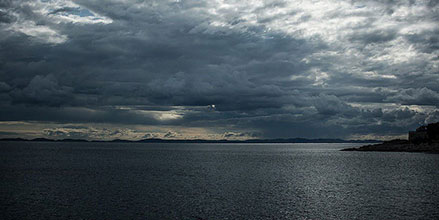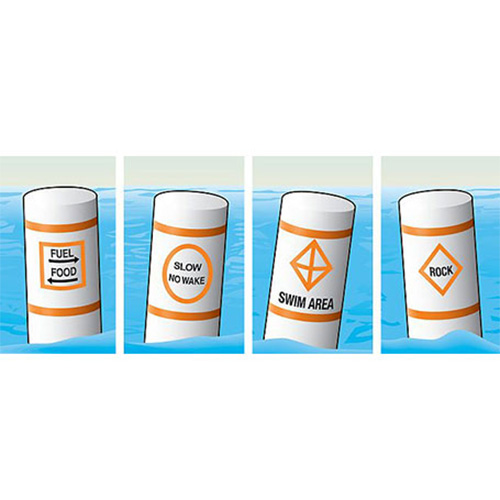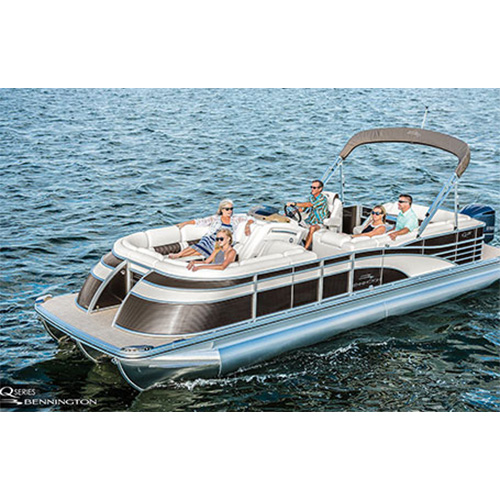
If You’re Caught In A Storm
Rainstorms—and especially thunderstorms—present a real risk to pontoon boaters. Aside from the danger of a lightning strike, storms can make the water rough enough to cause discomfort and even injury should someone be knocked off their feet. High winds can make the boat difficult to control, which can lead to groundings or collisions when attempting to dock or to maneuver in narrow channels.
Since no pontoon boater chooses to be on the water during a storm, avoidance is obviously the best policy. Before going out for the day, check the local weather and marine weather forecasts. When you’re on the boat, keep the VHF radio set for weather alerts. And keep your eyes open for signs of deteriorating weather. Learn to recognize storm clouds, including dark, anvil-shaped cumulonimbus clouds, shelf clouds and wall clouds—all signs of approaching thunderstorms—and the funnel-shaped clouds that are the signs of tornados. A sudden shift in wind direction accompanied by much cooler air is often the sign that a storm front has just moved over your location.
In any of these situations, the best response is to get off the water before the storm strikes. Tie up at the nearest marina, if possible, and get off the boat. If you trailered your boat to the lake, think twice before deciding to return to the ramp unless you’re sure you’ve got plenty of time. Aligning the boat and the trailer and getting the boat onto the trailer in high winds can be difficult and dangerous, and you definitely don’t want to be doing it during a lightning storm.
Beaching the boat on a soft, gently-shelving shore may be an option, but only if it’s protected from wind and waves. Beaching on a lee shore—a shore that the wind is blowing directly onto—can be disastrous. Waves could lift and drop the boat multiple times, damaging the pontoons and leaving it hard aground and impossible to relaunch. Your other options are anchoring and riding through the storm under power. In either case, get life preservers onto the entire crew. Stow all loose gear. Put away the alcohol. Lower the bimini or other canvas to reduce the boat’s wind profile. Lower your VHF antenna and disconnect it from the radio. Just before the storm hits, have the crew sit on the floor in the middle of the boat to lower the center of gravity and bring the center of effort away from the edges. Getting the crew low and centered will also reduce the amount of motion they feel, minimizing the chances of seasickness. Avoid touching any metal on the boat.
Anchoring safely requires good ground tackle—not a lightweight “lunch hook” tied to just any old rope you have in the lockers. Find a spot with good protection from wind and waves and good holding ground, and lay out the rode with a minimum scope of 8:1 (for example, in water 10 feet deep, use at least 80 feet of anchor rode). Two anchors laid out in a V from the bow are far better than one. Since the wind is likely to shift during the storm, make sure you have enough room for the boat to turn a complete circle at the end of the anchor rode without hitting anything. Turn on your lights to warn other boaters, who might have trouble seeing you if visibility gets really bad.
If anchoring isn’t safe and feasible, it’s safer to ride out the storm under power. Get into a part of the lake where there are no obstructions or dangers: nothing that you’ll have to maneuver around, and nothing you could hit should the wind take momentary control of the boat. Turn on your navigation lights and head into the wind at a minimum speed just enough to maintain your position, and take waves on a 45 degree angle.
Pontoon boats are extremely stable, and capsizing is a true rarity. Your biggest concerns are lightning and running aground, followed by slips and falls onboard. Follow the above advice to minimize these risks, and you’ll weather almost any storm with nothing more than discomfort and possibly some complaints from the crew about not having paid better attention to the weather forecast.
Whether you’re boating in storm or sunshine, Bennington pontoon boats are a great way to go. Find the dealer nearest you.












